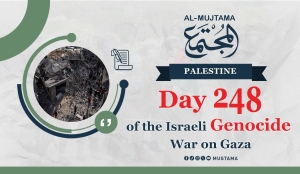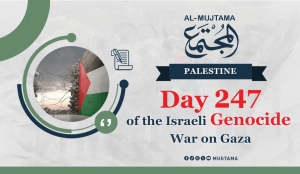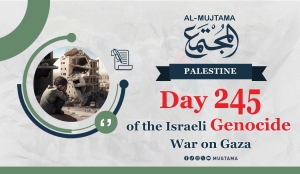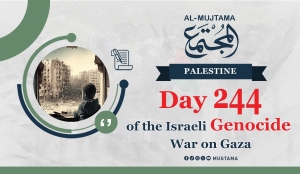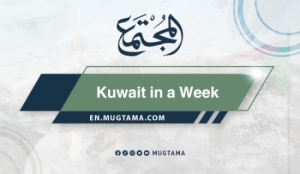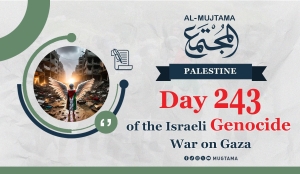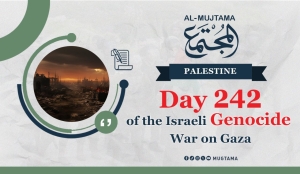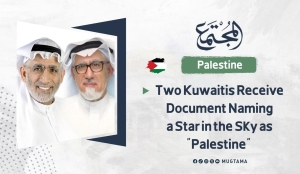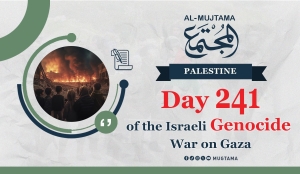Admin Mugtama
Day 248 of the Israeli Genocide War on Gaza
June 10, 2024The war of genocide waged by Israel against the besieged Gaza Strip has entered its 248th day, amidst the Zionist occupation forces continuing to commit war crimes against civilians, including women, children, and the elderly in the Gaza Strip, by launching dozens of air strikes, artillery shelling, and bloody massacres against civilians.
Occupation Commits 5 New Massacres
The occupation continues its aggression against Gaza, as medical sources revealed that more than 20 martyrs were killed in the continuous Zionist bombing of various areas in the Gaza Strip since dawn today.
During the past 24 hours, the occupation committed 5 massacres against families in the Gaza Strip, including 40 martyrs and 218 injuries, according to the Ministry of Health.
The Ministry confirmed in a statement that the toll of the aggression had risen to 37,124 martyrs and 84,712 injuries since the seventh of last October.
“UNRWA”: 20 Years to Erase the Destruction of Gaza
The United Nations Relief and Works Agency for Palestine Refugees (UNRWA) said that more than half of the buildings in the Gaza Strip were destroyed, adding through its account on the “X” platform that removing the rubble will take years.
In this context, agency spokesman Jonathan Fowler said in an interview with “Anadolu” that the destruction caused by the “Israeli” war on Gaza exceeds what resulted from World War II in Europe, and that it will take more than 20 years to erase it and rebuild the Palestinian Strip.
Prominent Resistance Operations
The Palestinian resistance continues to confront the Zionist forces penetrating into several areas of Gaza, as the “Al-Qassam Brigades” announced, today, Monday, the detonation of a booby-trapped house inside which a Zionist force was holed up in the Shaboura camp in the city of Rafah, noting that it left members of the force dead and wounded.
Al-Qassam said: Immediately upon the arrival of the rescue force, our mujahideen bombarded the vicinity of the house that was bombed with mortar shells.
It added that it targeted a D9 military bulldozer with an Al-Yassin 105 shell near Al-Awda Mosque in the center of Rafah, south of the Gaza Strip.
Resignation of Israeli Leaders
Yesterday evening, Sunday evening, the two ministers in the Zionist war government, Benny Gantz and Gadi Eisenkot, announced their resignation in objection to the way Netanyahu is conducting the war on Gaza.
Gantz and Eisenkot, partners in the State Camp party (12 MPs out of 120 in the Knesset), accused Netanyahu of pursuing policies that serve his own political interests and failing to achieve the declared goals of the war on Gaza, especially eliminating the Hamas movement and returning prisoners from the Strip. According to Anadolu Agency.
Yesterday, Sunday, the commander of the Gaza Division in the occupation army, Brigadier General Avi Rosenfeld, announced his resignation from his position due to his failure to protect the military bases and settlements adjacent to the Gaza Strip on October 7, according to what Anadolu reported, citing Hebrew media.
The Hebrew Broadcasting Corporation said: The commander of the Gaza Division, Brigadier General Avi Rosenfeld, announced his retirement, as a result of his failure in the mission to protect the Gaza envelope area.
Rosenfeld added, “Everyone must bear responsibility for what happened on October 7.”
Washington Considering Unilateral Agreement with Hamas
NBC News, citing current and former senior officials in the White House, revealed that the US administration discussed the possibility of negotiating a unilateral agreement with Hamas to secure the release of five American detainees in Gaza, if the current ceasefire talks fail.
The officials, who were briefed on the discussions, said that such negotiations would not include “Israel,” and would be conducted through Qatari interlocutors, as is customary.
Swansea University Withdraws its Investments
Al Jazeera Net reported that the British Swansea University announced its intention to withdraw its investment amounting to 5 million pounds sterling from Barclays Bank within the next two months.
The website explained that the decision came in response to the demands of the protesters who remained in the university grounds for 28 days in rejection of the continuation of the “Israeli” war on Gaza and the investment of their universities in companies that they consider supportive of the ongoing war on the Palestinians.
Day 247 of the Israeli Genocide on Gaza
June 09, 2024The war of genocide waged by Israel against the besieged Gaza Strip has entered its 247th day, amidst the Zionist occupation forces continuing to commit war crimes against civilians, including women, children, and the elderly in the Gaza Strip, by launching dozens of air strikes, artillery shelling, and bloody massacres against civilians.
Continuous bombing of central Gaza
The occupation intensifies its missile and artillery bombardment on the central governorate in Gaza, a day after it committed a massacre in the Nuseirat camp.
Palestinian sources reported that at least three citizens were martyred, and a number of injuries occurred, after the occupation targeted a house in the Bureij camp.
The same sources also announced the death of two citizens in the occupation bombing of the Tal al-Sultan neighborhood, west of the city of Rafah.
Medical sources reported that 4 martyrs arrived at Al-Aqsa Martyrs Hospital after they were recovered east of Al-Maghazi camp in the central Gaza Strip.
Victims of the Nuseirat Massacre Increased
The government media office in Gaza announced on Sunday that the number of victims of the Nuseirat camp massacre had risen to 274 martyrs and 698 injured, some of them in critical condition.
The government office said: The number of martyrs as a result of the “Israeli” occupation’s crime against civilians in the Nuseirat massacre yesterday reached 274 martyrs, including 64 children, 57 women, and 37 elderly people. Among the number of martyrs who arrived were bodies consisting of body parts, and it was difficult to identify them, while the number of casualties reached 698, including 153 children, 161 women, and 54 elderly people. Among the number of casualties were amputees and serious injuries.
50 Hungry Children in Northern Gaza
Medical sources announced on Sunday that 50 children are suffering from malnutrition and starvation in the northern Gaza Strip.
Sources at Kamal Adwan Hospital in Jabalia Camp said: About 50 children suffering from malnutrition were counted in just one week.
She added that the specter of famine looms over Gaza, and we recorded signs of malnutrition in some children.
Prominent Resistance Operations
The Palestinian resistance continues to confront the Zionist forces penetrating into several areas of Gaza, as the “Al-Qassam Brigades” announced today, Sunday, the destruction of the occupation forces stationed west of the Tal Al-Sultan neighborhood in the city of Rafah, south of the Strip, with heavy-caliber mortar shells.
Al-Qassam said: Its fighters were able to snipe a Zionist soldier in the Tal Zorob area, west of the city of Rafah, south of the Gaza Strip.
It added that it, in partnership with the "Jerusalem Brigades", bombed the "Sufa" military site with a missile salvo.
It also announced the targeting of an Apache helicopter with a SAM 7 missile in the sea sky of the city of Rafah, south of the Gaza Strip.
Israeli Soldier Committed Suicide
Hebrew Radio reported that a soldier committed suicide after receiving an order to return to military service in the Gaza Strip, according to the Palestinian Information Center.
Hebrew media reported that the soldier who committed suicide was a driver of a D9 bulldozer in Gaza for 78 days. He suffered psychological shock and the army did not recognize him as disabled, and the day before his return to the Strip, he committed suicide.
The suicide soldier had previously published pictures of his crimes and bragged about his acts of brutal destruction in the Gaza Strip.
Since October 7, 10 Zionist officers and soldiers have committed suicide, a number of whom committed suicide during battles in the settlements surrounding Gaza, according to the Hebrew newspaper Haaretz.
Day 246 of the Israeli Genocide War on Gaza
June 08, 2024The Zionist occupation forces continue to commit the crime of genocide in the Gaza Strip, for the 246th day in a row, by launching dozens of air strikes and artillery shelling, while committing massacres against civilians, amid a catastrophic humanitarian situation as a result of the siege and the displacement of more than 95% of the population.
Ninth Month of the Genocide War
The Palestinian Information Center reported that the occupation aircraft and artillery continued their raids and violent bombardment - today, Saturday - as the war of genocide enters its ninth month, in various parts of the Gaza Strip, targeting homes, displaced persons’ gatherings, and streets, killing dozens of martyrs and wounded.
The occupation forces continue their ground invasion of large neighborhoods in Rafah, while the incursion into the east of the Central Governorate continues for the fifth day, amid aerial and artillery bombardment and committing horrific massacres.
Incursion in Al-Zaytoun Neighborhood
Local sources reported a limited incursion by occupation vehicles east of the Al-Zaytoun neighborhood, southeast of Gaza City, amid violent clashes with the resistance in the area, coinciding with heavy gunfire and artillery shelling. The occupation vehicles fired fire and shells in the vicinity of the Kuwait Junction, south of the Al-Zaytoun neighborhood, south of Gaza.
Six people were martyred and others were injured as a result of the occupation forces targeting a house in the Bureij refugee camp in the central Gaza Strip.
The occupation aircraft launched a raid targeting a house for the Abu Ghalibah family, east of Deir al-Balah in the central Gaza Strip. Five were martyred, including a couple and their daughter, and 14 others were injured, including at least 8 children, in a bombing on a house in Gaza City, at dawn on Saturday.
The martyrs are: Youssef Muhanna, his wife Linda, their child, Ibrahim Muhanna, and the child Jana Ihab Muhanna. Local sources confirmed that the occupation forces targeted a home for the Muhanna family, in the Sheikh Radwan neighborhood in Gaza City, resulting in four martyrs and the injury of 14 others, most of whom were children and women.
Targeting Rafah
At dawn today, the occupation artillery targeted the center and west of the city of Rafah, in the south of the Gaza Strip, especially the Tal Al-Sultan neighborhood, and fired incendiary shells, which led to fires in the Oreiba area, north of the city.
Abu Ubaida: The Enemy Killed Some of its Prisoners
Abu Ubaida, the military spokesman for the Al-Qassam Brigades, revealed that what the Zionist enemy carried out in the Nuseirat area in the middle of the Gaza Strip is a complex war crime, and the first to be harmed by it were its prisoners.
Abu Ubaida added, in a tweet on his channel on the Telegram platform, a short while ago, that the enemy was able, by committing horrific massacres, to free some of his captives, but at the same time he killed some of them during the operation.
Abu Ubaida stressed that the operation would pose a great danger to the enemy prisoners and would have a negative impact on their conditions and lives.
Earlier today, the occupation army committed a massacre in Nuseirat in the central Gaza Strip, coinciding with its forces carrying out an operation that included the recovery of 4 Israeli prisoners and detainees. It launched a violent aerial bombardment and intense belts of fire, resulting in hundreds of martyrs and wounded civilians.
The Government Information Office in Gaza reported that the death toll from the occupation massacre in the Nuseirat camp reached 210, with more than 400 wounded.
The occupation announced the recovery of four Israeli prisoners and detainees and the killing of an officer in the "Al-Yamam" unit during the operation, which it described as "complicated."
The Ministry of Health in Gaza reported today that the occupation committed five massacres in the Gaza Strip, including 70 martyrs and 150 wounded who arrived at hospitals during the past 24 hours, bringing the toll to 36,801 martyrs and 83,680 wounded since October 7.
Day 245 of the Genocide War on Gaza
June 07, 2024The genocidal war waged by Israel against besieged Gaza has entered its 245th day, amid the Zionist occupation forces continuing to commit war crimes in the Gaza Strip, by launching dozens of air strikes, artillery shelling, and bloody massacres against civilians.
The occupation assassinates the mayor of Nuseirat
The occupation continues its aggression against Gaza, as it bombed a school housing displaced people, in the Beach Camp, west of Gaza City, which led to the death of three martyrs, one day after the massacre it committed in a school belonging to the United Nations Agency in the Nuseirat Camp in the central Gaza Strip, according to Palestinian sources.
10 citizens were martyred and others were injured in a raid launched by occupation aircraft on a house in the town of Abasan Al-Kabira, east of Khan Yunis, in the south of the Gaza Strip.
The occupation aircraft also launched a raid on the Nuseirat camp in the middle of the Gaza Strip, which led to the death of five martyrs, including the mayor of Nuseirat, Iyad Al-Maghari.
Al-Aqsa TV reported that 11 people were killed when occupation aircraft targeted a house near Al-Shamaa Mosque in the Al-Zaytoun neighborhood, southeast of Gaza City.
8 massacres within 24 hours
During the past 24 hours, the occupation committed 8 massacres against families in the Gaza Strip, including 77 martyrs and 221 injuries to hospitals.
The Ministry of Health in Gaza confirmed in a statement today, Friday, that the toll of the aggression had risen to 36,731 martyrs and 83,530 injuries since the seventh of last October.
The occupation bombed 150 shelter centers
The government media office in Gaza said: The “Israeli” occupation committed a new crime by targeting this Friday afternoon the Asmaa School shelter center in the Beach Camp, which led to the death of three citizens and the injury of seven others.
The office confirmed in a statement that by targeting this school, which is affiliated with UNRWA, the number of schools affiliated with it and designated as shelter centers has increased, and the occupation has bombed more than 150 schools. In addition to the bombing of dozens of other facilities, facilities and service centers belonging to UNRWA, which were designated to shelter displaced persons.
Prominent resistance operations
The Palestinian resistance continues to confront the Zionist forces penetrating into several areas of Gaza, as the “Al-Qassam Brigades” announced today, Friday, that its fighters were able to target a house in which a Zionist force was holed up with a “TBG” missile, leaving it dead and wounded.
Al-Qassam added that it had monitored the landing of the Zionist helicopter to evacuate the Zionist soldiers east of the city of Deir al-Balah in the middle of the Gaza Strip.
Al-Qassam also announced the targeting of a Zionist “Merkvah 4” tank with an “Al-Yassin 105” shell near the Awadallah Junction in the Yabna refugee camp in the city of Rafah, south of the Gaza Strip.
The Al-Quds Brigades, the military wing of the Islamic Jihad Movement, said that its fighters bombed the headquarters of the Gaza Division at the Ra'im base with a missile salvo.
Al Jazeera's correspondent reported that clashes took place between the Palestinian resistance and the occupation forces in the Qeshta neighborhood and the Halal market in Rafah.
Day 244 of the Israeli Genocide War on Gaza
June 06, 2024
The Israeli genocide war on Gaza has entered its 244th day, amid the Zionist occupation forces continuing to commit war crimes in the Gaza Strip, by launching dozens of air strikes, artillery shelling, and bloody massacres against civilians.
40 martyrs in Nuseirat camp
The occupation continues its aggression against Gaza, as it committed a massacre today, Thursday, in a school affiliated with the United Nations Relief and Works Agency for Palestine Refugees (UNRWA), in which hundreds of displaced people are located, in the Nuseirat camp in the central Gaza Strip, leading to the death and injury of dozens.
The government media office in Gaza reported that the Israeli occupation army killed 40 displaced people last night in bombing several rooms housing dozens of displaced people in an UNRWA school in the Nuseirat camp in the central Gaza Strip, noting that among the martyrs were 14 children and 9 women, in addition to one injury. 74 displaced people, including 23 children and 18 women.
The office added: We monitored the occupation army’s bombing of dozens of safe displaced civilians in the aforementioned school with at least three missiles from combat warplanes, which led to the fall of such a large number of martyrs and wounded, more than half of whom were children and women.
He explained that this center No. (149) is being targeted by the “Israeli” occupation army, and the occupation has repeatedly committed these massacres in a brutal manner despite its knowledge of the presence of tens of thousands in displacement centers.
25000 sick and wounded need to travel
The Ministry of Health in Gaza said: The number of sick and wounded who need to travel for treatment outside the Strip reached 25,000, adding that 4,895 were able to travel when the Rafah crossing was open.
The Ministry of Health added that since the occupation of the Rafah crossing on May 12, no sick or wounded person has been able to leave the Gaza Strip, exposing the lives of thousands to complications and death after the occupation deliberately destroyed most of the hospitals in the Strip and put them out of service.
Prominent resistance operations
The Palestinian resistance continues to confront the Zionist forces penetrating into several areas of Gaza. Today, Thursday, the Al-Qassam Brigades announced the detonation and elimination of a tunnel eye that had been booby-trapped by a Zionist foot force of 5 soldiers near Tal Zoroub, west of the city of Rafah, in the south of the Gaza Strip.
In a landing operation behind the lines, the “Qassam” mujahideen were able to penetrate the fleeting fence and attack the headquarters of the enemy division operating in the city of Rafah, south of the Gaza Strip.
It said: It targeted two D9 bulldozers and three Zionist Merkvah tanks with Al-Yassin 105 shells east of the city of Deir al-Balah in the central Gaza Strip.
The brigades were also able to destroy the enemy forces penetrating east of the Bureij camp in the center of the sector with heavy-caliber mortar shells.
Spain joins South Africa's lawsuit
Spain announced on Thursday that it will join South Africa in its lawsuit against the Israeli occupation before the International Court of Justice.
Spanish Foreign Minister Jose Manuel Albarez said, in a press conference, according to the Palestinian News Agency (WAFA), that his country had submitted a request to the court to join South Africa’s lawsuit, after studying this approach over the past weeks.
He added: We call again for an end to the bombing and a ceasefire in Gaza.
Spain became the first European country to join the lawsuit.
Kuwait in a week
June 06, 2024Thursday, June 6, 2024
Kuwait Cabinet pledges allegiance to H. H. Sheikh Sabah Al-Khaled, Crown Prince
On Sunday, the Council of Ministers held a special meeting chaired by His Highness Sheikh Ahmed Al Abdullah, Prime Minister, may God protect him, at Seif Palace.
At the beginning of the meeting, the Council of Ministers pledged allegiance to His Highness Sheikh Sabah Al-Khaled as Crown Prince, after the Emiri order was issued yesterday recommending His Highness as Crown Prince.
After the issuance of the Emiri order appointing His Highness Sheikh Sabah Khaled Al-Hamad Al-Mubarak Al-Sabah as Crown Prince, His Highness took the constitutional oath before the Council of Ministers.
Precious Trust
His Highness Sheikh Ahmed Al-Abdullah, Prime Minister, delivered a speech in which he expressed, on his own behalf and on behalf of his fellow ministers, his sincere congratulations and blessings to His Highness the Crown Prince Sheikh Sabah Khaled Al-Hamad Al-Sabah, may God protect him, on the occasion of the issuance of the Emiri order appointing His Highness as Crown Prince, expressing his great pride in the trust. The preciousness that His Highness the Amir, Sheikh Mishal Al-Ahmad, gave to his support and support, His Highness the Crown Prince, Sheikh Sabah Al-Khaled.
In his speech, His Highness Sheikh Ahmed Al-Abdullah, Prime Minister, recalled the blessed journey of His Highness the Crown Prince Sheikh Sabah Al-Khaled, full of remarkable achievements and clear national imprints, a symbol of loyalty, giving, sincerity and dedication to the love of the homeland.
His Highness Sheikh Ahmed Al-Abdullah affirmed that Kuwait is entering a new era, calling on everyone to be on the same page, united and supportive towards further progress and construction for our dear homeland, wishing success to His Highness the Crown Prince Sheikh Sabah Al-Khaled, and that he direct his steps for everything that is good and in the interest of our beloved Kuwait in the future. Under the wise leadership of His Highness the Amir Sheikh Mishal Al-Ahmad.
More Efforts
For his part, His Highness the Crown Prince Sheikh Sabah Al-Khaled expressed his sincere thanks and great gratitude to His Highness the Amir Sheikh Mishal Al-Ahmad for the trust placed in him by appointing him as Crown Prince. He also expressed his thanks and appreciation to His Highness Sheikh Ahmed Al-Abdullah, the Prime Minister, may God protect him, and the ministers for They congratulate him on the occasion of his appointment as Crown Prince, calling on the ministers to exert more effort and generosity to achieve everything that His Highness the Amir Sheikh Mishal Al-Ahmad and the honorable Kuwaiti people aspire to.
Two Kuwaitis Receive Document Naming a Star in the Sky as "Palestine"
The StarRegistration website adopted the name “Palestine” of a bright star in the sky at the request of training and media experts Dr. Musa Al-Mazidi, and his brother Dr. Zuhair Al-Mazidi.


The two Kuwaiti experts, Dr. Musa, Dr. Zuhair Al-Mazidi: The “StarRegistration” website, using information available from space agencies, including NASA, at their request, names a bright star in the sky, visible with the naked eye at night in the Kuwaiti sky, as “Palestine” (Palestine).
The two experts added that they received an official document to that effect and a picture of the star’s location in the sky, on May 30, 2024 AD. It was written in the document in English, “The State of Palestine exists to remain forever.”
 The two experts pointed out that the Al-Najma website is reserved under the name “Palestine” forever.
The two experts pointed out that the Al-Najma website is reserved under the name “Palestine” forever.
Naming a bright star in the sky “Palestine” comes as a step in increasing awareness of the Palestinian issue and enhancing international solidarity with the Palestinian people.
This step is considered an initiative to express the Kuwaiti people's love for Palestine and their interest in supporting the Palestinian cause.
To know the location of the “Palestine” star in the Kuwaiti sky, follow these steps:
1- Click https://star-finder.starregistration.net/?q=9EFF1C6E1.
2- Click on the search key at the top left of the page.
3- Enter the star registration number “5E5C2AE40”.
4- Click “return” key at the bottom of the page.
5- Click “show more” at the top center of the page.

The two Kuwaiti experts stated that after following these steps, the star appears in its name along with its location in the vast universe and its distance in light years from Earth (257.22 light years).
Namaa launches “With You Teachers” program
Namaa Charitable Center for Volunteer Work at the Social Reform Society announced the launch of the “With You Teachers” program, which aims to provide free intensive educational support to twelfth grade students in Kuwait, in cooperation with an elite group of male and female volunteer teachers from various parts of the country.
The program aims to review the curriculum with students prior to the exam period. Which contributes to improving their academic level and increasing their chances of success.
In this regard, Director of the Volunteer Center, Abeer Youssef Al-Hagras, said: The “With You Teachers” program is an educational volunteer initiative launched by the Nama Center for Volunteer Work, targeting twelfth grade students who are preparing to take the end-of-year exams, and a group of male and female teachers specializing in various subjects participate in the program. Scholars, who volunteer their time and expertise to help students review course material and understand difficult points and complex concepts.
Al Hajras explained that the project aims to improve the academic performance of twelfth grade students by providing comprehensive and intensive reviews of the curriculum. Which helps students understand the subjects better and prepare well for exams. The program also works to provide psychological support to students by providing a supportive and stimulating educational environment that helps them overcome anxiety and stress associated with the exam period.
Al-Hajras indicated that the program aims to enhance the spirit of volunteerism and community work among male and female teachers, and encourage them to perform their important societal role by participating in initiatives that serve the community and contribute to the development of the educational process. The program also contributes to reducing educational gaps among students by providing equal educational opportunities for all, regardless of their social or economic backgrounds.
Al-Hajras stressed that the importance of the “With You Teachers” program comes from the fact that it provides educational support at a crucial period in students’ academic lives, as the students’ performance in the twelfth-grade exams determines their academic and professional future. The program is also considered an investment in the students’ future, as improving their academic results opens the door to... They have wide doors for admission to the universities and specializations they desire. In addition, the program promotes the concept of community education, which includes all members of society in the educational process, where volunteers and the community cooperate to support students and enhance the educational process.
Al Hajras concluded her statement by saying: The program contributes to building a cooperative and united society, where individuals work together to achieve a common goal that serves the future of coming generations.
It is noteworthy that the “With You Teachers” program is an important step towards achieving high-quality education and an educated and cultured society. This initiative is not just a review program for students, but rather a message of hope, support and motivation for students to continue their educational journey with confidence and success.
Al-Bassam: “Al-Ashaiyat” Aims to Help the Needy inside Kuwait
Namaa Charitable Society of the Social Reform Society renewed the memorandum of partnership and cooperation with the General Secretariat of Endowments to implement the “Al-Ashaiyat” Bank. The agreement stipulated that Namaa would implement the “Al-Ashaiyat” Bank with funding from the General Secretariat of Endowments in implementation of the conditions for the endowments stipulated by the endowment arguments of the Secretariat.
In this regard, Head of the Financial Resources and Development Sector, Walid Al-Bassam, said: Al-Ashayyat Bank aims to help needy and poor families inside Kuwait face the burdens and responsibilities of life, and alleviate their burdens. By distributing magnetic cards to those families and providing food to those in need.
Al-Bassam added that Nama is studying the eligible cases, according to its documented official documents, which confirm the families’ need for support, stressing that it is implementing the project in a civilized manner that preserves the dignity of the needy and facilitates procedures. By distributing prepaid cards to cases eligible for purchase from central markets, the value of the card is determined according to the need of the case and the number of family members.
Al-Bassam stressed that such projects and others on which Namaa and charitable institutions are based are a safety valve and a source of rescue for deserving groups. It constitutes psychological, financial, and physical protection that contributes to spreading security, reassurance, and stability throughout society. It is permeated by brotherhood and solidarity and contributes to spreading a spirit of reassurance and psychological comfort among the members of society. It contributes significantly to putting a smile on the lips in a society where the call of brotherhood, solidarity and synergy is loudest.
Al-Bassam explained that Namaa Charity had agreed with a commercial market to distribute magnetic cards to these families, indicating that it intended to aid in the form of magnetic cards so that each family would obtain the necessary food supplies it needed.
Al-Bassam stressed that such projects enable Namaa Charity to translate the meanings of compassion and social solidarity and all the humanitarian principles and noble values that are achieved by alleviating the suffering of the needy and providing relief to the afflicted, the distressed and the poor, praising the efforts made by the General Secretariat of Endowments and the benefactors of the people of Kuwait who spare no effort in providing assistance to families. needy people, stressing the importance of compassion and solidarity that the people of Kuwait are known for.
Al-Bassam stated that Namaa Charity seeks to enhance ways of cooperation and partnership in various charitable and humanitarian projects with governmental and private agencies, including the General Secretariat of Endowments, stressing that Namaa has many partnerships with the General Secretariat of Endowments in many endowment banks, including seasonal ones such as Iftar for the fasting person and the sacrifice bank. Evenings and others.
New Partnership Agreement Between “Al-Nouri Charity” and “UNHCR”
The United Nations High Commissioner for Refugees and the Sheikh Abdullah Al-Nouri Charitable Society signed a new partnership agreement to support Syrian refugees in Jordan, as a cash grant worth $500,000 directed to livelihood projects for refugee families, with the aim of enabling 400 families to cover their most urgent needs through... Cash assistance for six months.
Speaking about the signing of the agreement, the Chairman of the Board of Directors of the Sheikh Abdullah Al-Nouri Charitable Society, Engineer Jamal Abdul Khaleq Al-Nouri, said that this is the fourth partnership between the association and the United Nations High Commissioner for Refugees, from which 400 Syrian refugee families in Jordan are scheduled to benefit for a period of six months by supporting them in achieving the means of life. The precious one,
Al-Nouri explained that the cooperation agreements concluded between the association and the UNHCR during the past three years, the results of which benefited more than 7,200 Syrian refugee families, reiterating the keenness of the Sheikh Abdullah Al-Nouri Charitable Association to continue the strategic partnership with the UNHCR for better humanitarian work and more field successes in supporting... Displaced people and refugees around the world.
Al-Nouri pointed out that mobile phone wallets have reduced the costs of delivering cash aid, enabling UNHCR to reach more refugees. He explained that mobile phone wallets owned by refugees preserve their dignity and enable them to manage their financial affairs independently and according to their needs and priorities.
Pointing out that the administrative percentage that the Commission deducts from the value of the grant is normal and acceptable for the implementation of the project, and is consistent with the percentage approved by other charitable societies.
The Chairman of the Board of Directors of Al-Nouri Charity indicated that the Commission is studying the cases deserving of support and assistance, and conducting interviews with them to determine the extent of their need, in addition to its keenness to avoid recurrence of cases.
For her part, Nisreen Al-Rubaian, representative of the United Nations High Commissioner for Refugees in the State of Kuwait, said in a statement: “The new agreement reflects the depth of the partnership with the Al-Nouri Charitable Society and the importance of cooperation with Kuwaiti charitable societies, which constitutes an extension and even a reflection of the encouragement and commitment of the Kuwaiti government to support UNHCR activities and the humanitarian response in “At a time when protracted humanitarian situations are widespread and funding is scarce, in a historic situation facing UNHCR.”
Al-Rubaian thanked the Kuwaiti people for their continued stance and support for refugees, and for their high sense of humanity in supporting various issues related to humanitarian crises.
Day 243 in the Israeli Genocide War on Gaza
June 05, 2024
The war of extermination waged by Israel against the besieged Gaza Strip has entered its 243rd day, amid the Zionist occupation forces continuing to commit war crimes and ethnic cleansing in Gaza, by launching dozens of air strikes, artillery shelling, and bloody massacres against civilians.
Zionist Aggression East of Bureij and Deir al-Balah
The occupation continues its aggression against Gaza, where last night, and at dawn on Wednesday, dozens of citizens were martyred and injured in the occupation’s missile and artillery bombardment on various areas of the Gaza Strip.
Medical sources reported that 38 citizens were martyred since last night in raids on the central Gaza Strip.
The occupation forces also committed a new massacre in the Maghazi refugee camp, which led to the death of 8 martyrs, as a result of an air strike at dawn on Wednesday, according to the “Palestinian Information Center.”
The occupation army announced that it had begun an aggression east of Bureij and east of Deir al-Balah in the central Gaza Strip, while it continued its incursion into the city of Rafah, south of the Strip.
The army said, in a statement: The “98th Division” began a military campaign in the area east of Bureij and east of Deir al-Balah, in conjunction with the continuation of the activities of the “162nd” and “99th” Divisions in the south and center of the Gaza Strip, according to what was reported by the “Anatolia” Agency.
36 martyrs within 24 hours
During the past 24 hours, the occupation committed 4 massacres in Gaza, including 36 martyrs and 115 injured in hospitals.
Thus, the death toll from the ongoing aggression on the Gaza Strip rose to 36,586 martyrs and 83,74 wounded.
One million people in Gaza face famine by July
A report by the Food and Agriculture Organization of the United Nations (FAO) expects that more than one million people in the Gaza Strip will face famine and death by mid-July.
The organization said, according to Anatolia Agency: “The ongoing conflict in Palestine is expected to exacerbate acute hunger, which is currently at a catastrophic level, with famine and deaths, as well as the displacement of the entire population of the Gaza Strip.”
Prominent resistance operations
The Palestinian resistance continues to confront the Zionist forces penetrating into several areas of Gaza. Today, Wednesday, the Al-Qassam Brigades announced the targeting of a D9 military bulldozer with an Al-Yassin 105 shell, east of the city of Al-Balah in the central Gaza Strip.
The "Jerusalem Brigades" announced that its fighters were engaged in fierce clashes with occupation soldiers and vehicles on the frontlines of the advance in the city of Rafah, south of the Gaza Strip.
10 casualties in the occupation army
The occupation army admitted that 10 soldiers were injured in the battles in the Gaza Strip in the last 24 hours. Thus, the total number of Israeli casualties rises to 3,730 officers and soldiers since the beginning of the war on the 7th of last October, 1,889 of whom were injured during the ground operation that began on the 27th of the same month, according to Al Jazeera Net.
The occupation army said: 254 officers and soldiers are still undergoing treatment after being injured in the Gaza battles, 31 of whom are seriously injured.
While the number of army deaths reached 644 officers and soldiers since the beginning of the war.
The fourth European country to recognize Palestine
Yesterday, Tuesday, Slovenia announced its official recognition of the State of Palestine, which brings the number of countries recognizing it to 148 out of 193 countries in the United Nations General Assembly, according to “Anatolia.”
For his part, Slovenian Prime Minister Robert Golub said through his social media account: Today’s recognition of Palestine as a sovereign and independent state gives hope to the Palestinian people in the West Bank and Gaza Strip.
This decision follows the decisions of Spain, Ireland and Norway, which officially recognized the Palestinian state in late May.
Day 242 of the Israeli Genocide War on Gaza
June 04, 2024The war of genocide waged by Israel against besieged Gaza has entered its 242nd day, as the Zionist occupation forces continue to commit genocidal war in the Gaza Strip, by launching dozens of air strikes, artillery shelling, and bloody massacres against civilians.
14 Martyrs Since Dawn
The occupation continues its aggression against Gaza, as the Palestinian News Agency reported that three citizens were martyred and others were injured, at dawn on Tuesday, by a missile strike from a warplane that targeted a house in the Bureij camp in the central Gaza Strip.
She added that the occupation aircraft targeted a house in Al-Maghazi camp in the middle of the Gaza Strip, which led to the death of 3 citizens and the injury of others.
In Deir al-Balah in the central Gaza Strip, 8 Palestinian policemen were martyred, and others were injured, in a Zionist bombing that targeted their car next to a center for sheltering displaced persons, according to the Palestinian Information Center.
71 martyrs in 7 massacres within 24 hours
During the past 24 hours, the occupation committed 7 massacres against families in the Gaza Strip, including 71 martyrs and 182 injuries.
The Ministry of Health in Gaza announced that the toll of the aggression had risen to 36,550 martyrs and 82,959 injuries since the seventh of last October.
Hamas calls for the occupation to be included among the criminal entities against children
The Islamic Resistance Movement (Hamas) called on the United Nations to include the occupation in the blacklist of criminal entities that target children with murder, torture, displacement, and denial of basic rights to normal life.
In a statement released on the occasion of the International Day of Innocent Child Victims of Aggression, the movement stated that the annual commemoration of the day by the UN and the global community serves as a reminder of the anguish and suffering endured by Palestinian children. They now have a moral, legal, and humanitarian obligation to stop the Zionist occupation's heinous crimes and ongoing violations against the children of Palestine.
Hamas added that there are more than 200 Palestinian children in the prisons of the fascist occupation, most of whom are school students. The Israeli enemy is practicing the most heinous punitive and hateful policies against them, including more than 20 children from the Gaza Strip, against whom various forms of beating, harsh interrogation, physical and psychological torture, and daily abuse are committed. She pointed out that children in prisons suffer from deliberate medical neglect, and are prevented from visiting their families, health teams, and human rights and humanitarian organizations.
Hamas also called on the international community, states, governments, and institutions concerned with children’s rights, to assume their political and humanitarian responsibilities towards the children of Palestine. These institutions must work to release those detained in the occupation’s prisons, and take action to save and protect them from its brutality and sadism, and stop and criminalize its aggression. And his crimes against our people and their children, and the victory for their legitimate rights to freedom and decent living.
Hamas stressed that the continued silence, inaction, and international inability to criminalize the occupation’s violations and its escalating aggression against children in Palestine, and the failure to take all means to prosecute the perpetrators of these crimes and hold them accountable represents a disgrace.
Prominent Resistance Operations
The Palestinian resistance continues to confront the Zionist forces penetrating into several areas of Gaza, as the “Al-Qassam Brigades” announced, today, Tuesday, the targeting of a military excavator and two Zionist “Merkvah” tanks with “Al-Yassin 105” shells in the Yabna camp in the city of Rafah in the southern Gaza Strip.
The "Jerusalem Brigades" announced that it had targeted enemy soldiers and vehicles stationed in the vicinity of Tal Zorob, southwest of the city of Rafah, with "107" missiles under direct guidance.
The "brigades" also bombed with heavy-caliber mortar shells a command and control headquarters belonging to the Zionist enemy in the "Abu Oreiban site" in the "Netzarim" axis.
Qatar: Biden's initiative is a roadmap for a permanent ceasefire in Gaza
Al Jazeera Net quoted Qatari Foreign Ministry spokesman Majid Al Ansari as saying: The principles contained in US President Joe Biden’s speech provide a roadmap for a permanent ceasefire in Gaza and ending the crisis.
Al-Ansari confirmed in a press conference on Tuesday that communications had not stopped with all parties concerned with the crisis in Gaza.
He added: So far, there are no clear positions from the “Israeli” and Palestinian sides regarding President Biden’s proposal, and the international community must put pressure on both parties to accept it.
Al-Ansari also said that a clear position has not been received from the Hamas movement regarding the initiative, but in “Israel” we notice a difference in positions among the ministers, as there are those who support the Biden initiative, and those who oppose it.
Fires Sweeping the Zionist Entity
Large fires broke out in a number of Israeli settlements in the northern occupied Palestinian territories as a result of missile and drone attacks launched from Lebanon.
Reports reported by the BBC Arabic website reported that a number of houses caught fire in the Kiryat Shmona settlement, and firefighting teams deployed throughout the settlement, which was mostly evacuated, to control the fire.
According to the Anadolu Agency, the occupation firefighting crews are continuing attempts to extinguish widespread fires in the north ignited by the fall of missiles and drones launched by Hezbollah from Lebanon, and the drought and heat threaten to spread them.
The agency stated that the fires caused the evacuation of residents from settlements in the north that had previously been evacuated under the weight of the beginning of the confrontations with Hezbollah, on October 8.
Al Jazeera Net reported on the Hebrew Channel 12 that the fires had consumed thousands of dunams in the Upper Galilee, and that the true extent of the damage was still unknown.
According to the Hebrew news website Ynet, 16 people, including 7 reserve soldiers, were slightly injured due to smoke inhalation.
The StarRegistration website adopted the name “Palestine” of a bright star in the sky at the request of training and media experts Dr. Musa Al-Mazidi, and his brother Dr. Zuhair Al-Mazidi.


The two Kuwaiti experts, Dr. Musa, Dr. Zuhair Al-Mazidi: The “StarRegistration” website, using information available from space agencies, including NASA, at their request, names a bright star in the sky, visible with the naked eye at night in the Kuwaiti sky, as “Palestine” (Palestine).
The two experts added that they received an official document to that effect and a picture of the star’s location in the sky, on May 30, 2024 AD. It was written in the document in English, “The State of Palestine exists to remain forever.”
 The two experts pointed out that the Al-Najma website is reserved under the name “Palestine” forever.
The two experts pointed out that the Al-Najma website is reserved under the name “Palestine” forever.
Naming a bright star in the sky “Palestine” comes as a step in increasing awareness of the Palestinian issue and enhancing international solidarity with the Palestinian people.
This step is considered an initiative to express the Kuwaiti people's love for Palestine and their interest in supporting the Palestinian cause.
To know the location of the “Palestine” star in the Kuwaiti sky, follow these steps:
1- Click https://star-finder.starregistration.net/?q=9EFF1C6E1.
2- Click on the search key at the top left of the page.
3- Enter the star registration number “5E5C2AE40”.
4- Click “return” key at the bottom of the page.
5- Click “show more” at the top center of the page.

The two Kuwaiti experts stated that after following these steps, the star appears in its name along with its location in the vast universe and its distance in light years from Earth (257.22 light years).
Day 241 of the Israeli Genocide War on Gaza
June 03, 2024The genocidal war waged by Israel against the women, children, and elderly of the Gaza Strip has entered its 241st day, amid the Zionist occupation forces continuing to commit ethnic cleansing in Gaza, by launching dozens of air strikes, artillery shelling, and bloody massacres against civilians.
21 Martyrs in Gaza Since Dawn Today
The occupation continues its aggression against Gaza, as the Palestinian News Agency reported the death of 21 citizens, since dawn on Monday, in separate raids by the occupation warplanes and artillery, on the center and south of the Gaza Strip.
The Ministry of Health in Gaza announced that the occupation committed 4 massacres against families in the Gaza Strip, including 40 martyrs and 150 injuries during the past 24 hours.
The Ministry confirmed that the toll of the aggression had risen to 36,479 martyrs and 82,777 injuries since the seventh of last October.
3,500 Children are at Risk of Starvation
The government media office in Gaza warned that more than 3,500 children were exposed to death in the Strip due to the Israeli occupation’s policies of starvation, food shortages, lack of nutritional supplements, and prevention of aid.
The office said: More than 3,500 children under the age of five are at risk of gradual death in the Gaza Strip due to the Israeli occupation’s policies of starving children, lack of milk and food, lack of nutritional supplements, depriving them of vaccinations, and preventing the entry of humanitarian aid for the fourth week in a row amid silence. Terrible international.
The government office called on the International Criminal Court, all other international courts, and all free judges in the world, to pursue the “Israeli” and American war criminals who systematically and intentionally target children, and throw them into a historical holocaust that the world has never witnessed before, demanding that these criminals be brought to a fair court as criminals. war and hold them accountable for their crimes.
Prominent Resistance Operations
The Palestinian resistance continues to confront the Zionist forces penetrating into several areas of Gaza. Today, Monday, the Al-Qassam Brigades announced the detonation of a minefield in a Zionist force stationed inside the site of the Martyr Muhammad Abu Shamala Brigade, killing and wounding members of the force in the Tal Al-Sultan neighborhood, west of the city of Rafah, south of the Gaza Strip.
Al-Qassam also targeted a Zionist D9 bulldozer with a Tandom shell in the vicinity of the Collegiate College, south of the Al-Sabra neighborhood in Gaza City.
Al-Qassam also announced that they destroyed masses of enemy forces in Gaza City, with mortar shells.
Thet added that their fighters also detonated a booby-trapped house in a Zionist foot force, leaving them dead and wounded near the “Zalata” junction, east of the Al-Shoka area in the city of Rafah, south of the Gaza Strip.
“Al-Quds Brigades" announced bombing enemy soldiers and vehicles penetrating the vicinity of Tal Zoroub, west of the city of Rafah.
The "brigades" added: In conjunction with the "Al-Amoudi Brigade - Al-Aqsa Martyrs' Brigades", we bombed a position of enemy soldiers and vehicles in the "Netzarim" axis, south of Gaza City, with a barrage of heavy-caliber mortar shells.
14 Casualties among the Occupation Forces
The Zionist occupation army announced that 14 soldiers were injured in the battles in the Gaza Strip in the past 24 hours.
The Zionist army said in a statement: 3,703 officers and soldiers were injured since the beginning of the war, including 1,878 during the ground operation.
They added that 254 officers and soldiers are still undergoing medical treatment after being injured in the Gaza battles, 32 of whom have serious injuries, according to what Al Jazeera Net reported.
British Labor Leader Pledges to Recognize Palestine
The leader of the British opposition Labor Party, Keir Starmer, expressed his conviction of the necessity of recognizing a Palestinian state.
Starmer called on the occupying state to stop its aggression against the city of Rafah in the southern Gaza Strip, indicating that stopping the war in Gaza would be among his party's priorities if it came to power.
The leader of the British Labor Party said, according to Al Jazeera Net: “There must be a political process through which we recognize a Palestinian state, and if we come to power, we will discuss this with our allies.”
He also expressed his intention to conduct a legal review if he came to power to find out whether the occupying state was using the weapons it received from Britain in its attack on the city of Rafah.

